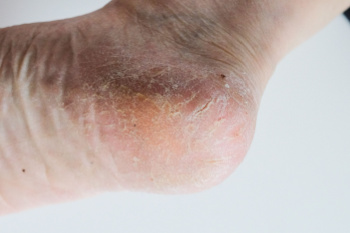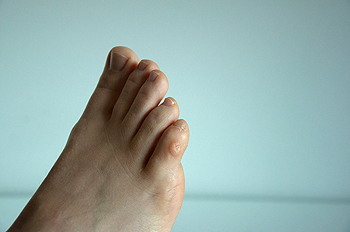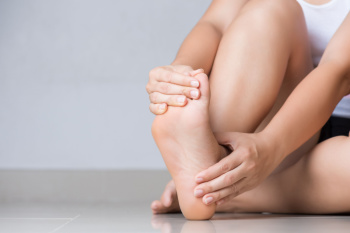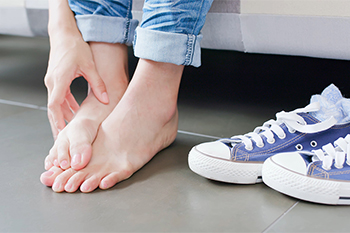
Cracked heels are a common foot condition that can lead to discomfort and even pain if left untreated. They often develop when the skin surrounding the heels becomes dry and thick, leading to splits or fissures. Prolonged standing on hard surfaces can put extra pressure on the feet, causing the skin to expand and crack. As people age, their skin loses moisture and elasticity, making it more prone to dryness. Wearing open-heeled shoes or sandals exposes the heels to air and friction, which can further dry out the skin. Obesity can also contribute to cracked heels, as the increased weight places added pressure on the heel area. Cracked heels can be uncomfortable, and may cause difficulty in completing daily activities. If you have this condition, it is suggested that you confer with a podiatrist who can offer effective treatment solutions, which may include prescribed medication.
Cracked heels are unsightly and can cause further damage to your shoes and feet. If you have any concerns, contact one of our podiatrists from Bazzi Podiatry. Our doctors can provide the care you need to keep you pain-free and on your feet.
Cracked Heels
Cracked heels appear unappealing and can make it harder for you walk around in sandals. Aside from looking unpleasant, cracked heels can also tear stockings, socks, and wear out your shoes. There are several methods to help restore a cracked heel and prevent further damage.
How Do You Get Them?
Dry skin is the number one culprit in creating cracked heels. Many athletes, walkers, joggers, and even swimmers suffer from cracked heels. Age and skin oil production play a role to getting cracked heels as well.
Promote Healing
Over the counter medicines can help, especially for those that need instant relief or who suffer from chronic dry feet.
Wear Socks – Wearing socks with medicated creams helps lock in moisture.
Moisturizers – Applying both day and night will help alleviate dryness which causes cracking.
Pumice Stones – These exfoliate and remove dead skin, which allows for smoother moisturizer application and better absorption into the skin.
Change in Diet
Eating healthy with a well-balanced diet will give the skin a fresh and radiant look. Your body responds to the kinds of food you ingest. Omega-3 fatty acids and zinc supplements can also revitalize skin tissue.
Most importantly, seek professional help if unsure how to proceed in treating cracked heels. A podiatrist will help you with any questions or information needed.
If you have any questions, please feel free to contact one of our offices located in Detroit, West Detroit, Northwest Detroit, Sterling Heights, Hamtramck, Dearborn Heights, Madison Heights, Redford, and Livonia, MI . We offer the newest diagnostic and treatment technologies for all your foot care needs.

Corns are thickened areas of skin that usually develop on or between the toes as the result of constant pressure or friction. Corns on the toes or feet can make walking difficult and painful, especially when the affected area rubs against the inside of your shoe. A defining feature of a corn is its hardened core, which can press into the deeper layers of skin and cause sharp pain or tenderness that limits mobility. Symptoms may include dry, flaky skin, discomfort when wearing shoes, and raised, rough bumps that are painful to the touch. Poorly fitting footwear is a common cause of corns, especially styles that crowd the toes or create pressure points. A podiatrist can provide treatment to safely remove a corn as well as suggest prevention strategies. If you have foot pain that is caused by a corn, it is suggested that you schedule an appointment with a podiatrist for an exam and appropriate treatment.
Corns can make walking very painful and should be treated immediately. If you have questions regarding your feet and ankles, contact one of our podiatrists of Bazzi Podiatry. Our doctors will treat your foot and ankle needs.
Corns: What Are They? And How Do You Get Rid of Them?
Corns are thickened areas on the skin that can become painful. They are caused by excessive pressure and friction on the skin. Corns press into the deeper layers of the skin and are usually round in shape.
Ways to Prevent Corns
There are many ways to get rid of painful corns such as:
- Wearing properly fitting shoes that have been measured by a professional
- Wearing shoes that are not sharply pointed or have high heels
- Wearing only shoes that offer support
Treating Corns
Although most corns slowly disappear when the friction or pressure stops, this isn’t always the case. Consult with your podiatrist to determine the best treatment option for your case of corns.
If you have any questions please feel free to contact one of our offices located in Detroit, West Detroit, Northwest Detroit, Sterling Heights, Hamtramck, Dearborn Heights, Madison Heights, Redford, and Livonia, MI . We offer the newest diagnostic and treatment technologies for all your foot and ankle needs.

Arch pain can result from tight muscles, overuse, or conditions like plantar fasciitis. Stretching the feet helps improve flexibility, reduce tension, and promote better foot function. A simple stretch involves sitting and pulling the toes back toward the shin to lengthen the arch. Rolling a ball or frozen water bottle under the foot massages the area and eases tightness. Standing calf stretches also benefit the arch by loosening the Achilles tendon and lower leg muscles. Using a towel to gently pull the toes upward provides additional relief. Strengthening exercises, such as toe curls and picking up small objects with the toes, improve stability and support. Arch pain can cause difficulty in completing daily activities. If you have this foot condition, it is suggested that you consult a podiatrist who can determine what the cause is and offer treatment, which might include additional stretches for relief.
Why Stretching Is Important for Your Feet
Stretching the feet is a great way to prevent injuries. If you have any concerns with your feet consult with one of our podiatrists from Bazzi Podiatry. Our doctors will assess your condition and provide you with quality foot and ankle treatment.
Stretching the Feet
Stretching the muscles in the foot is an important part in any physical activity. Feet that are tight can lead to less flexibility and make you more prone to injury. One of the most common forms of foot pain, plantar fasciitis, can be stretched out to help ease the pain. Stretching can not only ease pain from plantar fasciitis but also prevent it as well. However, it is important to see a podiatrist first to determine if stretching is right for you. Podiatrists can also recommend other ways to stretch your feet. Once you know whether stretching is right for you, here are some excellent stretches you can do.
- Using a foam roller or any cylindrical object (a water bottle or soda can will do), roll the object under your foot back and forth. You should also exert pressure on the object. Be sure to do this to both feet for a minute. Do this exercise three times each.
- Similar to the previous exercise, take a ball, such as a tennis ball, and roll it under your foot while seated and exert pressure on it.
- Grab a resistance band or towel and take a seat. If you are using a towel, fold it length wise. Next put either one between the ball of your foot and heel and pull with both hands on each side towards you. Hold this for 15 seconds and then switch feet. Do this three times for each foot.
- Finally hold your big toe while crossing one leg over the other. Pull the toe towards you and hold for 15 seconds. Once again do this three times per foot.
It is best to go easy when first stretching your foot and work your way up. If your foot starts hurting, stop exercising to ice and rest the foot. It is advised that you then see a podiatrist for help.
If you have any questions, please feel free to contact one of our offices located in Detroit, West Detroit, Northwest Detroit, Sterling Heights, Hamtramck, Dearborn Heights, Madison Heights, Redford, and Livonia, MI . We offer the newest diagnostic and treatment technologies for all your foot care needs.

Athlete's foot is a fungal infection that affects the skin on the feet, typically between the toes. It causes itching, burning, redness, and peeling or cracking skin. In severe cases, blisters may form, leading to pain and discomfort. Athlete’s foot is caused by fungi thriving in warm, damp environments like locker rooms, around swimming pools, or sweaty shoes. To prevent athlete’s foot, it is important to keep your feet clean and dry, especially between the toes. Change socks regularly, wear breathable shoes, and avoid walking barefoot in public places. Antifungal powders or sprays can help keep the feet dry and reduce the risk of infection. A podiatrist can treat athlete's foot with prescription antifungal medications and provide guidance on proper foot hygiene. They can also offer advice on footwear and recommend lifestyle changes to reduce the risk of recurrence. If you are continuously dealing with athlete’s foot, it is suggested that you schedule an appointment with a podiatrist for appropriate treatment methods, which may include prescribed medication.
Athlete’s foot is an inconvenient condition that can be easily reduced with the proper treatment. If you have any concerns about your feet and ankles, contact one of our podiatrists from Bazzi Podiatry. Our doctors will treat your foot and ankle needs.
Athlete’s Foot: The Sole Story
Athlete's foot, also known as tinea pedis, can be an extremely contagious foot infection. It is commonly contracted in public changing areas and bathrooms, dormitory style living quarters, around locker rooms and public swimming pools, or anywhere your feet often come into contact with other people.
Solutions to Combat Athlete’s Foot
- Hydrate your feet by using lotion
- Exfoliate
- Buff off nails
- Use of anti-fungal products
- Examine your feet and visit your doctor if any suspicious blisters or cuts develop
Athlete’s foot can cause many irritating symptoms such as dry and flaking skin, itching, and redness. Some more severe symptoms can include bleeding and cracked skin, intense itching and burning, and even pain when walking. In the worst cases, Athlete’s foot can cause blistering as well. Speak to your podiatrist for a better understanding of the different causes of Athlete’s foot, as well as help in determining which treatment options are best for you.
If you have any questions please feel free to contact one of our offices located in Detroit, West Detroit, Northwest Detroit, Sterling Heights, Hamtramck, Dearborn Heights, Madison Heights, Redford, and Livonia, MI . We offer the newest diagnostic and treatment technologies for all your foot and ankle needs.




